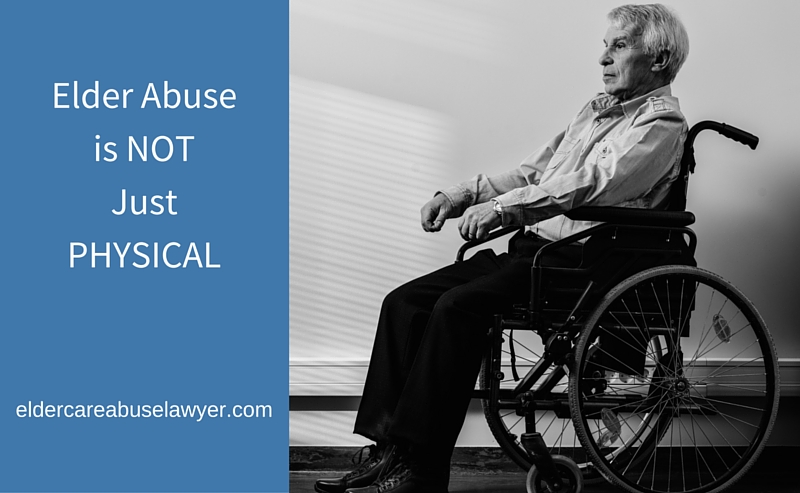
Elder abuse is a deplorable and inexcusable crime that goes unreported far too often. Abuse may go unnoticed even when there are physical injuries. Unfortunately, signs of psychological abuse are more difficult to detect. Family members are responsible for nine out of 10 elder abuse cases, but nursing facilities also neglect patients or use inappropriate techniques to manage their behavior. According to some sources, verbal and emotional mistreatment are the most common types of elder abuse.
Examples of Non-Verbal and Psychological Elder Abuse
The effects of non-verbal abuse and neglect can be just as painful as physical wounds. Actions or inactions by caregivers can cause serious physical harm as well as depression and psychological injuries. Neglect represents more than half of the 2.1 million reported elder abuse cases each year.
Here are a few examples of non-verbal abuse and the effects of psychological intimidation:
- Ignoring an elderly person can cause dehydration, weight loss and bed sores. Victims of neglect may have poor hygiene and live in unsanitary or unsafe conditions.
- To exert control, caregivers may use fear tactics and do things like abandoning seniors in public places.
- It’s not uncommon for abusive caregivers and nursing home staff to isolate seniors from their friends or prohibit them from participating in enjoyable activities. This type of oppression and psychological abuse can lead to depression and personality changes.
- The actions of caregivers have a profound effect on the well-being of elderly individuals. Victims of abuse may live in constant fear and suffer from extreme anxiety and nervousness.
Examples of Verbal Elder Abuse
Verbal lashings are different than other types of abuse because caregivers tend to display this behavior in front of witnesses or in public places. Abusers like to feel powerful, so they use verbal insults to intimidate their elders and make them feel helpless. Insulting someone in front of witnesses can add to the humiliation.
- Abusers intimidate and humiliate seniors with verbal threats to teach them a lesson.
- Witnesses might hear the abuser routinely yelling insults and profanities at the victim.
- Abusive caregivers may habitually blame seniors to make them feel guilty.
- Verbal abuse includes behavior that mocks, ridicules, imitates or belittles the patient.
- The victim may display nervousness around the caregiver, and the relationship may feel strained.
- Abusers may scold and criticize seniors. They might also treat them like children.
In extreme cases of verbal or physiological abuse, victims may become so withdrawn that they display dementia-like behavior. Warning signs include rocking, shaking or mumbling.
Chemical Restraint
In nursing homes, staff members sometimes overmedicate residents for non-medical reasons. Antipsychotic medications and anti-anxiety medications are used to sedate patients and restrict their movement for the convenience of workers. Physicians must sign an order for these drugs to be used, and they must outline a medical need as well as the expected duration. However, these guidelines are virtually ignored.
Psychotropic medications are unnecessarily administered to disable patients with dementia and Alzheimer’s and to silence those who complain. Some 300,000 dementia patients and nearly one-fifth of long-term nursing home residents receive these medications daily. Antipsychotic drugs with black-box warnings increase residents’ confusion and the risk of falls. According to the FDA, 15,000 patients die annually due to the unnecessary use of antipsychotic drugs. Here are three warning signs associated with chemical restraint.
- Visitors are barred from seeing the patient during normal hours.
- The patient is out of sorts or displays unusual behavior.
- The patient is unresponsive during visits.
Elder abuse has been called a silent epidemic. All adults over the age of 60 are vulnerable to abuse, exploitation and neglect. Awareness of each type of abuse, whether it’s financial, physical or emotional, needs to be increased. Because victims rarely report abuse due to feelings of shame or a fear of retaliation, concerned neighbors, friends and relatives need to be advocates.
